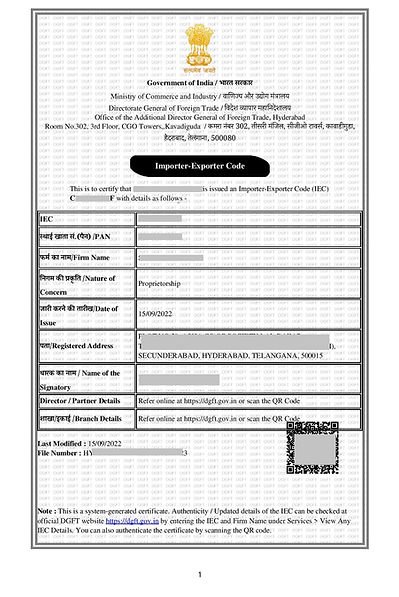Import Export Code
To import or export products or services from India, companies must register for a 10-digit Import Export (IE) Code, issued by the Directorate General of Foreign Trade (DGFT) under the Ministry of Commerce and Industry, Government of India.

Objectives
In India, an Import Export Code (IEC) is mandatory for carrying out any import or export activities. Without an IEC, no individual or business is permitted to import or export goods. The IEC is also required to conduct transactions and claim benefits under schemes such as SEIS and MEIS.
While services and technology are generally exempt from needing an IEC, exceptions exist in specific cases involving trade restrictions—for example, transactions related to nuclear weapons or automatic firearms.
An IEC is valid for the lifetime of the entity and does not require renewal or periodic filing. Once issued, it can be used freely for all import and export activities. Therefore, even if a business does not currently need it, obtaining an IEC is recommended.
All importers must provide their IEC when clearing goods through customs in India, and all exporters must include their IEC when shipping goods abroad. Additionally, the Reserve Bank of India (RBI) requires that anyone involved in importing or exporting services mention their IEC when receiving international payments in their bank account. As a result, anyone engaging in import or export in India must have a valid IEC.
Documents required for IEC Code:
Working hours (daily and weekly) and rules for work distribution and rest periods.
Business timings, specifying opening and closing hours, days of closure, and compliance with national and religious holidays.
Special provisions for the employment of children, young people, and women.
Regulations concerning yearly, maternity, sick, and other types of leave.
Rules for employment procedures and service termination.
Requirements for record-keeping and maintaining registers.
Mandatory display of notices.
Proprietorship:
Commercial, trading, banking, and insurance entities.
Administrative or service establishments where the primary activity is office work.
Hospitality venues such as hotels, restaurants, boarding houses, dining houses, and cafés.
Public entertainment venues, including theaters, cinemas, and similar facilities.
Partnership firm:
- A digital photograph of the designated partner or director of the company signing the application (3x3cm).
- A copy of the application entity’s PAN card.
- A copy of the voter’s I-Card, driving licence, passport (first and last pages), voter’s I-Card, UID (Aadhar card), or PAN (any one of these) of the managing partner or director who is signing the application.
- The RoC-issued certificate of incorporation
- A sale document in the event that the business space is self-owned; a rental or lease agreement in the event that the office is rented; or the most recent electricity or telephone bill.
- Bank Certificate in accordance with ANF 2 A(I)/Cancelled Cheque with the Company Name and Account Number Pre-printed.
LLP firm:
- A digital photo (3 x 3 cm) of the applicant/secretary or chief executive who is the signatory.
- A copy of the application entity’s PAN card.
- A copy of the voter’s I-Card, driving licence, PAN, voter’s passport (first and last pages), or voter’s UID (Aadhaar card) of the Secretary, Chief Executive, or Managing Trustee who is signing the application.
- A sale document in the event that the business space is self-owned; a rental or lease agreement in the event that the office is rented; or the most recent electricity or telephone bill.
- A copy of the Trust Deed and the Societies Registration Certificate
- A cancelled check bearing the pre-printed name of the Registered Society or Trust and the A/C No. or a bank certificate in accordance with ANF 2A(I).
